Magnesium
-
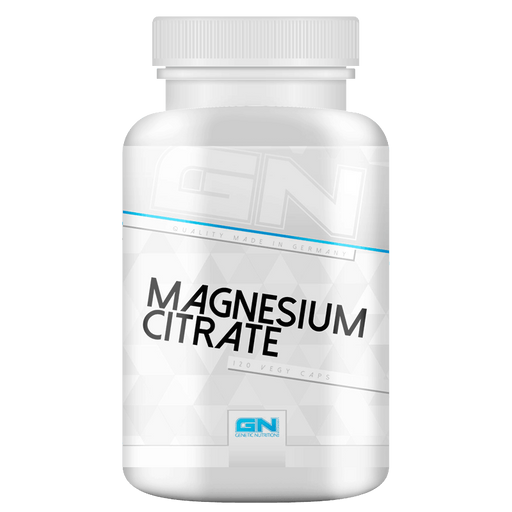 Sold out
Original price €16,90Original price €16,90 - Original price €16,90Original price €16,90Current price €15,04€15,04 - €15,04Current price €15,04| /
Sold out
Original price €16,90Original price €16,90 - Original price €16,90Original price €16,90Current price €15,04€15,04 - €15,04Current price €15,04| /Magnesium Citrate · 120 capsules
GN Laboratories29 reviewsMagnesium is probably one of the best-known minerals and is incredibly important for a number of processes in the body. Various metabolic processes...
View full detailsOriginal price €16,90Original price €16,90 - Original price €16,90Original price €16,90Current price €15,04€15,04 - €15,04Current price €15,04| /Sold out -
 Save 11%
Save %
Original price €16,90Original price €16,90 - Original price €16,90Original price €16,90Current price €15,04€15,04 - €15,04Current price €15,04| /
Save 11%
Save %
Original price €16,90Original price €16,90 - Original price €16,90Original price €16,90Current price €15,04€15,04 - €15,04Current price €15,04| /Magnesium bisglycinate · 120 capsules
Gods Rage31 reviewsMagnesium is involved in countless processes in the human body. It influences your immune system and a whole range of metabolic processes. Gods Rag...
View full detailsOriginal price €16,90Original price €16,90 - Original price €16,90Original price €16,90Current price €15,04€15,04 - €15,04Current price €15,04| /Save 11% Save % -
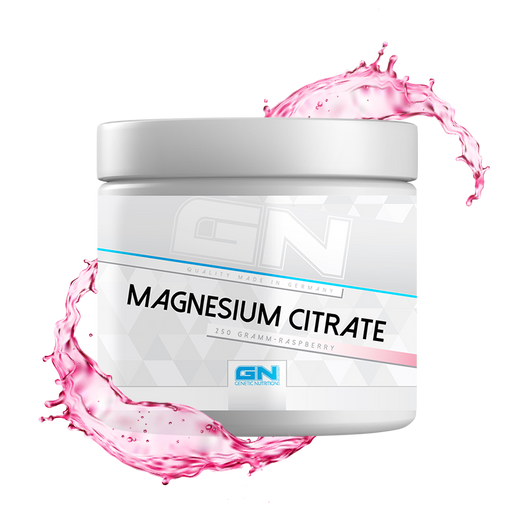 Save 0%
Save %
Original price €14,90 - Original price €14,90Original price €14,90€14,90€14,90 - €14,90Current price €14,90| /
Save 0%
Save %
Original price €14,90 - Original price €14,90Original price €14,90€14,90€14,90 - €14,90Current price €14,90| /Magnesium Citrate · 250g
GN Laboratories13 reviewsMagnesium is a mineral that plays a decisive role in a number of processes in the human organism. Various metabolic processes, the immune system, c...
View full detailsOriginal price €14,90 - Original price €14,90Original price €14,90€14,90€14,90 - €14,90Current price €14,90| /Save 0% Save % -
 Save 0%
Save %
Original price €14,90 - Original price €14,90Original price €14,90€14,90€14,90 - €14,90Current price €14,90| /
Save 0%
Save %
Original price €14,90 - Original price €14,90Original price €14,90€14,90€14,90 - €14,90Current price €14,90| /Magnesium Citrate Powder · 250g
Gods Rage25 reviewsMagnesium is of crucial importance for a whole range of functions in the human body. It influences the metabolism, the immune system, the cardiovas...
View full detailsOriginal price €14,90 - Original price €14,90Original price €14,90€14,90€14,90 - €14,90Current price €14,90| /Save 0% Save % -
 Save 11%
Save %
Original price €16,90Original price €16,90 - Original price €16,90Original price €16,90Current price €15,04€15,04 - €15,04Current price €15,04| /
Save 11%
Save %
Original price €16,90Original price €16,90 - Original price €16,90Original price €16,90Current price €15,04€15,04 - €15,04Current price €15,04| /Magnesium bisglycinate · 120 capsules
Big Zone1 review1000mg magnesium bisglycinate per capsule contributes to the reduction of tiredness and fatigue contributes to normal energy metabolism contribute...
View full detailsOriginal price €16,90Original price €16,90 - Original price €16,90Original price €16,90Current price €15,04€15,04 - €15,04Current price €15,04| /Save 11% Save % -
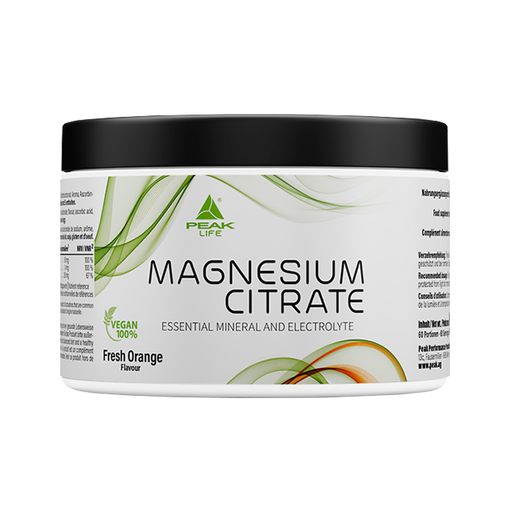 Save 0%
Save %
Original price €13,90 - Original price €13,90Original price €13,90€13,90€13,90 - €13,90Current price €13,90| /
Save 0%
Save %
Original price €13,90 - Original price €13,90Original price €13,90€13,90€13,90 - €13,90Current price €13,90| /Magnesium citrate · 240g
PEAK4 reviewsEssential mineral in powder form with high bioavailability Contributes to normal muscle function (e.g. popular for cramps) Contributes to normal e...
View full detailsOriginal price €13,90 - Original price €13,90Original price €13,90€13,90€13,90 - €13,90Current price €13,90| /Save 0% Save % -
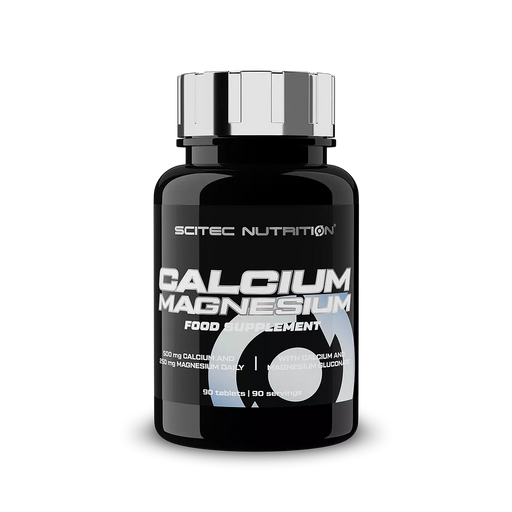 Save 11%
Save %
Original price €13,90Original price €13,90 - Original price €13,90Original price €13,90Current price €12,37€12,37 - €12,37Current price €12,37| /
Save 11%
Save %
Original price €13,90Original price €13,90 - Original price €13,90Original price €13,90Current price €12,37€12,37 - €12,37Current price €12,37| /Calcium-Magnesium · 90 tablets
SCITEC Nutrition2 reviewsCalcium and magnesium are essential minerals for the body They contribute to the maintenance of bones, teeth and the normal functioning of the ner...
View full detailsOriginal price €13,90Original price €13,90 - Original price €13,90Original price €13,90Current price €12,37€12,37 - €12,37Current price €12,37| /Save 11% Save % -
 Save 11%
Save %
Original price €6,90Original price €6,90 - Original price €6,90Original price €6,90Current price €6,14€6,14 - €6,14Current price €6,14| /
Save 11%
Save %
Original price €6,90Original price €6,90 - Original price €6,90Original price €6,90Current price €6,14€6,14 - €6,14Current price €6,14| /Magnesium + Chelates · 60 capsules
Biotech USANo reviewsMagnesium + Chelate from BioTech USA contains easily utilizable magnesium in the form of Mg-bisglizinate. The product ensures optimal utilization ...
View full detailsOriginal price €6,90Original price €6,90 - Original price €6,90Original price €6,90Current price €6,14€6,14 - €6,14Current price €6,14| /Save 11% Save % -
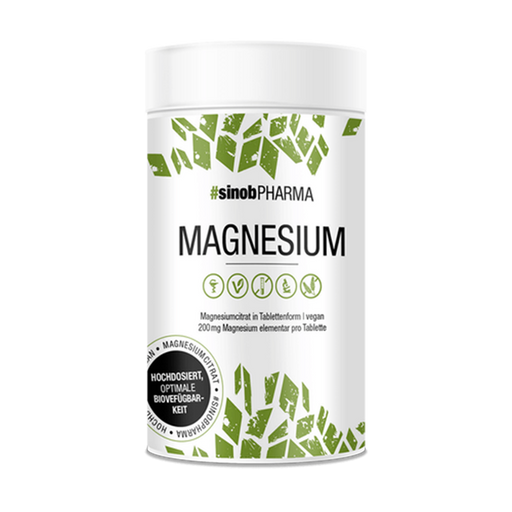 Save 11%
Save %
Original price €12,90Original price €12,90 - Original price €12,90Original price €12,90Current price €11,48€11,48 - €11,48Current price €11,48| /
Save 11%
Save %
Original price €12,90Original price €12,90 - Original price €12,90Original price €12,90Current price €11,48€11,48 - €11,48Current price €11,48| /Magnesium citrate · 120 tablets
#sinobNo reviewsHigh-quality magnesium citrate: Our product contains 200 mg of elemental magnesium per tablet in the form of magnesium citrate for optimum bioavai...
View full detailsOriginal price €12,90Original price €12,90 - Original price €12,90Original price €12,90Current price €11,48€11,48 - €11,48Current price €11,48| /Save 11% Save % -
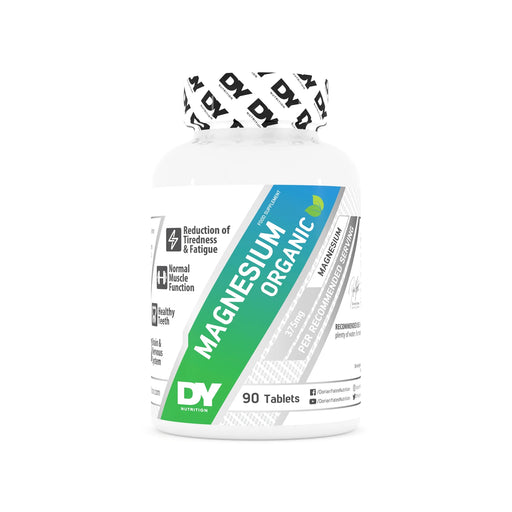 Save 11%
Save %
Original price €12,90Original price €12,90 - Original price €12,90Original price €12,90Current price €11,48€11,48 - €11,48Current price €11,48| /
Save 11%
Save %
Original price €12,90Original price €12,90 - Original price €12,90Original price €12,90Current price €11,48€11,48 - €11,48Current price €11,48| /Magnesium Organic · 90 tablets
DY NutritionNo reviewsMagnesium deficiency is common in industrialized countries due to a diet with poor sources of magnesium. Magnesium citrate from DY Nutrition off...
View full detailsOriginal price €12,90Original price €12,90 - Original price €12,90Original price €12,90Current price €11,48€11,48 - €11,48Current price €11,48| /Save 11% Save %
Magnesium is a silver-white light metal that oxidizes to silver-grey magnesium oxide when exposed to air. It has the atomic number 12, the chemical symbol Mg, and is assigned to the alkaline earth metals in the periodic table of elements. It was discovered and described as an element in 1755 by the English chemist Joseph Black (1728- 1799). The element was named after the Greek peninsula of Magnesia. It is found, for example, in the dolomite rock of the Dolomites as calcium magnesium carbonate. In seawater, around 15% of the salts are dissolved in the form of magnesium chloride. Magnesium is rarely used in technology due to its low hardness and high susceptibility to corrosion. In contrast, magnesium alloys, for example with aluminium, are characterized by a low density and therefore a low weight, as well as high strength and corrosion resistance. Such alloys are increasingly being used in the construction of motor vehicles, aircraft and ships. For example, NASA used a magnesium alloy containing around 85% magnesium, 14% lithium and 1% aluminum to build the Saturn V rocket. It is the eighth most common element in the earth's crust. However, due to its high chemical reactivity, it does not occur in its pure form, but only in various compounds.
In medicine, magnesium is considered a bulk element. An adult's body contains an average of 25 grams of magnesium. More than half of this magnesium is stored in the bones, most of the remainder in the cell interior, only about 1% is dissolved in the blood (1). Magnesium has physiological functions in bone formation and muscle metabolism. Incidentally, the mineral (taken in good time) is considered an insider tip against "hangovers", i.e. headaches the day after a night of drinking.
Magnesium is also important in medicine and pharmacy as a component of some antacids, i.e. medicines to combat excessive stomach acid, and some laxatives.
Functions in the body
Alongside calcium, to which it has a physiological counterpart function, magnesium plays a decisive role in building and maintaining the skeletal system and teeth and stabilizes the inner cell skeleton of cells. It also regulates muscle and nerve functions by controlling muscle contraction, among other things, through the magnesium concentration. To date, around 300 enzymes are known that require the "cooperation" of magnesium for their activity. In energy metabolism in particular, the positively charged magnesium ion (Mg2+) is required to stabilize the negatively charged phosphate ions (PO43-) in the ATP (adenosine triphosphate) molecule. Together with ADP (adenosine diphosphate), ATP is a key substance in biological energy transfer.
Magnesium is involved in over 600 reactions in the human body. These include (2):
- Energy supply: magnesium is required for the conversion of food into energy.
- Protein synthesis: Magnesium is required for the synthesis of body proteins from amino acids.
- Gene maintenance: Magnesium is needed for the production and repair of DNA and RNA.
- Muscle movement: Magnesium is part of the contraction and relaxation of muscles.
- Nervous system regulation: Magnesium helps regulate neurotransmitters that carry messages to the brain and nervous system.
Potential health benefits of magnesium
Magnesium has a variety of health benefits. Here is a brief overview of some of these, including the underlying scientific research.
Magnesium can enhance exercise performance
Magnesium plays an important role in exercise performance. During exercise, the body needs up to 10 to 20% more magnesium than at rest, depending on the activity performed (4). Magnesium helps to transport blood to the muscles and remove lactate from the muscles, which can accumulate in the muscles during exercise and cause pain (5).
Studies have shown that magnesium supplementation can improve exercise performance in athletes, the elderly and people with chronic diseases (6, 7, 8). In one study, volleyball players who took 250 mg of magnesium daily improved their jumps and arm movements (9).
In another study, athletes who supplemented with magnesium for four weeks achieved better times when running, swimming and cycling during a triathlon. They also experienced reductions in insulin levels and stress hormone levels (10). However, the study evidence is mixed. Other studies found no benefits of magnesium supplements in athletes with normal magnesium levels (11, 12).
Summary: Magnesium supplements have been shown to improve exercise performance in some studies, but the evidence is mixed.
Magnesium can fight depression
Magnesium plays a crucial role in brain function and mood, and low magnesium levels are associated with an increased risk of depression (13, 14). An analysis of over 8,800 people found that people under the age of 65 with the lowest magnesium levels had a 22% higher risk of depression (14). Some experts believe that the low magnesium levels in the modern diet could be causing many cases of depression and mental illness (16). However, others emphasize the need for further research in this area (16).
Regardless, supplementation with this mineral could help reduce symptoms of depression and in some cases the results can be dramatic (15, 17). In a controlled study of elderly subjects suffering from depression, 450 mg of magnesium per day was as effective at improving mood as a pharmaceutical antidepressant (17).
Summary: There may be a link between depression and magnesium deficiency. Magnesium supplementation may reduce symptoms of depression in some people.
Magnesium may also be beneficial for people suffering from type 2 diabetes
Studies suggest that 48% of people with type 2 diabetes have low blood magnesium levels. This may affect the ability of insulin to keep blood glucose levels under control (1, 18).
In addition to this, studies suggest that people with low magnesium intake are at higher risk of developing diabetes (19, 20). One study, which followed more than 4,000 people over a 20-year period, found that those with the highest magnesium intake had a 47% lower risk of developing diabetes (21). Another study showed that people with type 2 diabetes who received high daily doses of magnesium showed a significant improvement in blood glucose levels and hemoglobin A1c levels compared to a control group (22).
However, these effects may depend on how much magnesium is consumed in the diet. In another study, magnesium supplementation did not improve blood glucose or insulin levels in people who were not magnesium deficient (23).
Summary: People who consume the highest amount of magnesium have a lower risk of type 2 diabetes. In addition, magnesium supplements have been shown to lower blood sugar levels in some people.
Magnesium can lower blood pressure
Studies show that taking magnesium can lower blood pressure (24, 25, 26). In one study, subjects who took 450 mg of magnesium per day experienced a significant reduction in systolic and diastolic blood pressure (27).
However, these effects may only be seen in people who suffer from high blood pressure. Another study found that magnesium lowered blood pressure in subjects with high blood pressure, but showed no effect in people with normal blood pressure (28).
Summary: Magnesium may help lower blood pressure in people with high blood pressure, but it does not appear to have the same effect in people with normal blood pressure.
Magnesium has anti-inflammatory benefits
Low magnesium levels are associated with chronic inflammation, which is a driving force in aging, the development of obesity and chronic disease (29, 30, 31).
One study found that children with the lowest magnesium levels had the highest levels of the inflammatory marker CRP. They also had higher blood glucose levels, higher insulin levels and higher triglyceride levels (32).
Magnesium supplements can lower CRP levels and other markers of inflammation in older adults, overweight people and people suffering from prediabetes (33, 34, 35). In the same way, magn
Summary: Magnesium has been shown to help fight inflammation. It reduces levels of the inflammatory marker CRP and provides numerous other benefits.
Magnesium can help prevent migraine attacks
Migraine headaches are painful and disabling. They are often accompanied by nausea, vomiting and hypersensitivity to light and noise. Some scientists believe that people who suffer from migraines are more likely than others to be deficient in magnesium (36).
In fact, recent encouraging studies suggest that magnesium may help prevent and even treat migraine attacks (37, 38). In one study, supplementation with 1 gram of magnesium relieved migraine attacks in adults faster and more effectively than regular medicine (39).
In addition, magnesium-rich foods may help reduce migraine symptoms (40).
Summary: People who regularly suffer from migraines may have low magnesium levels. Some studies show that supplementation with this mineral may provide relief for migraines.
Magnesium can reduce insulin resistance
Insulin resistance is one of the leading causes of metabolic syndrome and type 2 diabetes. It is characterized by an impaired ability of muscle and liver cells to properly absorb sugar from the bloodstream. Magnesium plays an important role in this process and many people suffering from metabolic syndrome are magnesium deficient (3).
In addition, the high insulin levels that accompany insulin resistance lead to a loss of magnesium via the urine, which further reduces magnesium levels in the body (41).
Fortunately, increasing magnesium intake can help (42, 43, 44). One study found that supplementation with this mineral reduced insulin resistance and blood glucose levels even in people with normal blood levels (45).
Summary: Magnesium supplements can improve insulin resistance in people suffering from metabolic syndrome or type 2 diabetes.
Magnesium can alleviate PMS symptoms
Premenstrual syndrome (PMS) is one of the most common disorders in women of childbearing age. Symptoms include water retention, abdominal cramps, fatigue and irritability.
Interestingly, magnesium has been shown to improve mood, reduce water retention and alleviate other PMS symptoms (46, 47).
Summary: Magnesium supplements have been shown to reduce symptoms that can occur in women with PMS.
Foods containing magnesium
In general, it can be said that whole grain products, raw vegetables, nuts and chocolate are rich in magnesium. Examples of particularly magnesium-rich foods include sunflower seeds (420 mg/100 g), sesame seeds (370 mg/100 g), unhulled rice (160 mg/100 g), wheat germ (250 mg/100 g), chocolate (140 mg/100 g) and oatmeal (140 mg/100 g). You should also look for a high magnesium content when choosing mineral water. Good mineral waters can contain over 80 mg of magnesium per liter.
The following foods are also excellent sources of magnesium:
- Pumpkin seeds: 46% of the daily requirement in a quarter cup (16 grams)
- Spinach, cooked: 39% of the daily requirement per cup (180 grams)
- Swiss chard, cooked: 38% of the daily requirement per cup (175 grams)
- Dark chocolate (70-85% cocoa): 33% of the daily requirement per 100 grams
- Black beans: 30% of the daily requirement per cup (172 grams)
- Quinoa, cooked: 33% of the daily requirement per cup (185 grams)
- Halibut: 27% of the daily requirement per 100 grams
- Almonds: 25% of the daily requirement in a quarter cup (24 grams)
- Cashews: 25% of the daily requirement in a quarter cup (30 grams)
- Mackerel 19% of the daily requirement per 100 grams
- Avocado: 15% of the daily requirement in one medium-sized avocado (200 grams)
- Salmon: 9% of the daily requirement per 100 grams
Magnesium supplements
People who suffer from a medical condition should discuss taking magnesium supplements with their doctor in advance. Although magnesium supplements are generally well tolerated, they may not be safe for people taking certain diuretics, heart medications or antibiotics.
Supplement forms of magnesium. Those that are well absorbed by the body include citrates, glycinates, orotates and carbonates.
Deficiency symptoms, hypomagnesemia
Normal values are given for magnesium. These are 0.8 to 1.1 mmol/l when magnesium is determined in plasma or serum. Hypomagnesemia is present below 0.8 mmol/l, with clear symptoms, such as increased excitability of the skeletal muscles and the central nervous system, only occurring above approx. 0.4 mmol/l. Hypomagnesemia is often accompanied by hypocalcemia, i.e. a calcium deficiency.
Unfortunately, studies suggest that about 50% of all people in the US and Europe consume less than the daily recommended amount of magnesium (1, 3).
A magnesium deficiency can manifest itself in a number of ways:
- Muscle and calf cramps
- Restlessness, nervousness, dizziness, lack of concentration
- Headaches, migraines
- Heart disorders: tachycardia, cramps in the heart muscles, arrhythmia and heart pain.
- Gastrointestinal problems such as nausea, vomiting, diarrhea, cramps
Reasons for a magnesium deficiency:
- Chronic alcoholism
- Abuse of laxatives
- Chronic diarrhea or surgical removal of intestinal segments
- Increased renal (via the kidneys) excretion of magnesium (e.g. in hyperaldosteronism, diabetics or prolonged use of diuretics).
Overdose, hypermagnesemia and intoxication
In healthy people there are generally no overdoses, too much ingested magnesium is excreted. However, if kidney function is impaired, an excess of magnesium can occur, especially if magnesium-containing drugs such as antacids or laxatives are taken.
The normal values for magnesium in plasma or serum are between 0.8 and 1.1 mmol/l. The symptoms of an overdose develop depending on the magnesium concentration in the blood. For example, diarrhea and reduced excitability of the muscles and the central nervous system can occur from approx. 2 mmol/l. Magnesium concentrations above 5 mmol/l lead to symptoms of paralysis, impaired excitation formation and propagation in the heart and a drop in blood pressure. Respiratory depression, nausea and vomiting may also occur. An extreme overdose of magnesium can lead to respiratory and cardiac arrest.
Magnesium poisoning
Magnesium poisoning causes the symptoms already described for hypermagnesemia. Treatment of magnesium poisoning consists of gastric lavage and/or intravenous injection with 10% calcium gluconate solution or 0.5 to 1 mg neostigmine. In addition, respiratory support or stabilization of the circulation may be necessary.
Requirements
The German Nutrition Society (Deutsche Gesellschaft für Ernährung) specifies a daily magnesium requirement of 300-400 mg for adolescents aged 16 and over and adults. It should be noted that men require slightly more than women due to their larger skeletal mass. For children up to 4 years 80 mg and up to 15 years 120-300 mg are recommended.
Pregnant women should take around 350 mg and breastfeeding mothers around 390 mg daily. In the last months of pregnancy, magnesium is often prescribed by gynecologists to inhibit premature labor. The following groups of people may also have an additional need for magnesium: Athletes, who lose a lot of magnesium through sweat; diabetics, who excrete more magnesium through their urine; alcoholics; and older people, who often do not drink enough. Furthermore, the intake of some medicines can be a reason for an increased magnesium requirement. The following medicines are mentioned as examples: Aminoglycosides, Ciclosporin, oral contraceptives, laxatives, glucocorticoids, diuretics, etc. In addition, people with heart disease may have an increased need for magnesium, but people with heart disease should always discuss any additional intake of magnesium supplements with the doctor treating them. It is assumed that the daily requirement of magnesium should be roughly covered by a normal diet. The body absorbs magnesium much better in organic compounds (such as magnesium citrate, aspartate and glutamate) than in inorganic compounds (magnesium carbonate, magnesium oxide). Short-term shortages in magnesium intake are bridged by the magnesium reserves in the bones. However, deficiencies can occur in the event of illness, malnutrition or frequently in older people.
Requirements in sport
Although it is known that a deficiency of this mineral, which severely impairs physical performance, occurs quite frequently, many athletes still take in too little magnesium. Studies on competitive athletes have shown that only a sufficient supply of magnesium in the body enables effective training. Athletes certainly have a higher magnesium requirement than normal people. If you also consider that magnesium deficiency is fairly widespread in the population, it becomes clear that competitive athletes in particular can benefit from supplementing their diet with magnesium. The likelihood of a deficiency in athletes is further increased by magnesium losses through sweat. Accordingly, two studies have shown that magnesium supplementation has a positive effect on both untrained and trained individuals. A recommended daily dose of magnesium is 6mg per kilogram of body weight, i.e. approx. 500mg of a magnesium supplement for an athlete weighing 80 kilos.
Safety and side effects
Magnesium is probably safe and harmless for most people when taken orally or through the correct use of prescription injectable products. In some people, magnesium can cause stomach upset, nausea, vomiting, diarrhea and other side effects.
Doses below 350 mg of magnesium per day are safe for most adults. High doses can result in excessive accumulation of magnesium in the body, which can cause serious side effects including irregular heartbeat, low blood pressure, confusion, slow breathing, coma and death.
Precautions and warnings
Pregnancy and breastfeeding: Magnesium is probably safe for pregnant and breastfeeding women when taken in the recommended amounts. These amounts depend on the woman's age. Pregnant and breastfeeding women should consult their doctor to find out what amounts are right for them.
Heart block: High doses of magnesium, typically administered intravenously, should not be given to people suffering from heart block.
Kidney problems such as kidney failure: Kidneys that are not functioning well have problems excreting magnesium. Taking extra magnesium could result in a build-up of magnesium in the body that can reach dangerous levels. For this reason, you should not take magnesium if you suffer from kidney problems.
Interactions of magnesium with the following medications should be taken with caution:
Antibiotics (aminoglycoside antibiotics)
Some antibiotics can affect the muscles. These antibiotics are known as aminoglycoside antibiotics. Magnesium can also affect the muscles. Taking aminoglycoside antibiotics and giving a magnesium injection could cause muscle problems.
Antibiotics (quinolone antibiotics)
Magnesium could reduce the amount of quinolone antibiotics that the body can absorb. Taking magnesium in combination with quinolone antibiotics could reduce the effectiveness of quinolone antibiotics. To avoid this interaction, quinolone antibiotics should be taken at least two hours before or four to six hours after taking magnesium supplements.
Antibiotics (tetracyline antibiotics)
Magnesium can bind to tetracyline antibiotics in the stomach. This reduces the amount of tetracyline antibiotics that the body can absorb. Taking magnesium in combination with tetracyline antibiotics could reduce the effectiveness of tetracyline antibiotics. To avoid this interaction, magnesium should be taken two hours before or four hours after taking tetracyline antibiotics.
Bisphosphonates
Magnesium can reduce the amount of bisphosphonates absorbed by the body. Taking magnesium in combination with bisphosphonates can reduce the effectiveness of bisphosphonates. To avoid this interaction, bisphosphonates should be taken at least two hours before magnesium or later in the day.
Medication for high blood pressure
Magnesium could lower blood pressure. Taking magnesium in combination with medication for high blood pressure could result in an excessive drop in blood pressure.
Muscle relaxants
Magnesium appears to help relax the muscles. Taking magnesium in combination with muscle relaxants could increase the risks and side effects of muscle relaxants.
Diuretics (potassium-sparing diuretics)
Some diuretics can increase magnesium levels in the body. Taking these diuretics in combination with magnesium could result in excessively high magnesium levels in the body.
Conclusion
Getting enough magnesium is essential for maintaining good health. For this reason, you should make sure to eat plenty of magnesium-rich foods or take magnesium supplements if you are unable to meet your magnesium needs through food alone.
Without adequate amounts of magnesium, the human body cannot function optimally.
References:
- https://www.ncbi.nlm.nih.gov/pubmed/26404370
- https://www.ncbi.nlm.nih.gov/pubmed/25540137
- https://www.ncbi.nlm.nih.gov/pubmed/22364157
- https://www.ncbi.nlm.nih.gov/pubmed/17172008
- https://www.ncbi.nlm.nih.gov/pubmed/24465574
- https://www.ncbi.nlm.nih.gov/pubmed/22760901
- https://www.ncbi.nlm.nih.gov/pubmed/16825271
- https://www.ncbi.nlm.nih.gov/pubmed/25008857
- https://www.ncbi.nlm.nih.gov/pubmed/24015935
- https://www.ncbi.nlm.nih.gov/pubmed/9794094
- https://www.ncbi.nlm.nih.gov/pubmed/11252079
- https://www.ncbi.nlm.nih.gov/pubmed/1299490
- https://www.ncbi.nlm.nih.gov/pubmed/23950577
- https://www.ncbi.nlm.nih.gov/pubmed/25748766
- https://www.ncbi.nlm.nih.gov/pubmed/16542786
- https://www.ncbi.nlm.nih.gov/pubmed/23321048
- https://www.ncbi.nlm.nih.gov/pubmed/19271419
- https://www.ncbi.nlm.nih.gov/pubmed/26322160
- https://www.ncbi.nlm.nih.gov/pubmed/21868780
- https://www.ncbi.nlm.nih.gov/pubmed/24089547
- https://www.ncbi.nlm.nih.gov/pubmed/20807870
- https://www.ncbi.nlm.nih.gov/pubmed/12663588
- https://www.ncbi.nlm.nih.gov/pubmed/25204013
- https://www.ncbi.nlm.nih.gov/pubmed/19617879
- https://www.ncbi.nlm.nih.gov/pubmed/9719052
- https://www.ncbi.nlm.nih.gov/pubmed/24149738
- https://www.ncbi.nlm.nih.gov/pubmed/19020533
- https://www.ncbi.nlm.nih.gov/pubmed/19359148
- https://www.ncbi.nlm.nih.gov/pubmed/25023192
- https://www.ncbi.nlm.nih.gov/pubmed/20388094
- https://www.ncbi.nlm.nih.gov/pubmed/20536778
- https://www.ncbi.nlm.nih.gov/pubmed/1764100
- https://www.ncbi.nlm.nih.gov/pubmed/21199787
- https://www.ncbi.nlm.nih.gov/pubmed/21159786
- https://www.ncbi.nlm.nih.gov/pubmed/24814039
- https://www.ncbi.nlm.nih.gov/pubmed/22426836
- https://www.ncbi.nlm.nih.gov/pubmed/12786918
- https://www.ncbi.nlm.nih.gov/pubmed/18705538
- https://www.ncbi.nlm.nih.gov/pubmed/25278139
- https://www.ncbi.nlm.nih.gov/pubmed/25533715
- https://www.ncbi.nlm.nih.gov/pubmed/7587003
- https://www.ncbi.nlm.nih.gov/pubmed/24084051
- https://www.ncbi.nlm.nih.gov/pubmed/21205110
- https://www.ncbi.nlm.nih.gov/pubmed/15223977
- https://www.ncbi.nlm.nih.gov/pubmed/12663588
- https://www.ncbi.nlm.nih.gov/pubmed/2067759
- https://www.ncbi.nlm.nih.gov/pubmed/9861593










